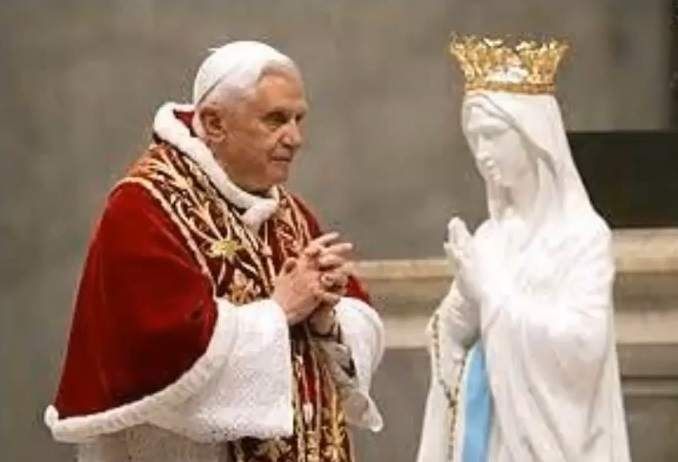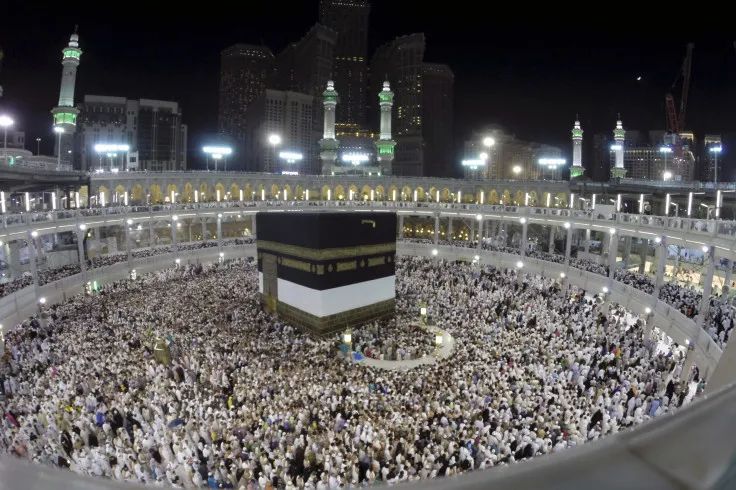By Elizabeth Prata

Yesterday I wrote about idolatry: what is it, how we manufacture idols, and worshipping an idol isn’t always (or even very frequently) bowing down to a wooden idol.
It made me think of the idolatry Catholics people have for Mary.
Due to Mary’s role in being selected to gestate and birth the incarnated Jesus and to raise Him alongside Joseph, the Roman Catholic religion has exalted the woman to a position she does not biblically hold. The Roman Catholic believers call Mary a co-redemptrix along with Jesus, the Queen of Heaven, and more. They pray to her, ask for her blessings, and more.
The Catholics will complain that ‘we just don’t understand’ about Mary, but if you look at their Papal Bulls, Catechisms, and other material, it’s all there. They worship Mary, which is bad and wrong and heresy.
It is always good to push back on the blasphemies and promote the truth about Mary.
Ex-Catholic VM Swiderski published some refutations on Twitter, which as expected, Catholic believers complained about. Catholicism is a false religion, but I do admire their adherents’ vigorous protection of their reputation. Satan does a good job of pushing back. What follows is her material, which is also linked above-
VM Swiderski @VMSwiderski wrote:
I was raised Roman Catholic. When God caused me to be born again by His Spirit, I began reading, understanding, and devouring His Word. I began rejecting false doctrines I had been taught. In the process, I overlooked something very important. Mary.
Mary was chosen by God.
Mary worshiped God.
Mary was humble.
Mary was submissive to the will of God.
Mary was favored by God.
Mary was blessed by God.
Mary was a virgin before Jesus was born.
Mary had many children after Jesus was born.
Mary was among the disciples.
Mary prayed to God.
Bible verses about Mary:
“Greetings, O favored one, the Lord is with you!” Luke 1:28
“And the angel said to her, ‘Do not be afraid, Mary, for you have found favor with God.’” Luke 1:32
“And Mary said to the angel, ‘How will this be, since I am a virgin?’” Luke 1:34
“And Mary said, ‘Behold, I am the servant of the Lord.’” Luke 1:38
“‘Blessed are you among women, and blessed is the fruit of your womb!’” Luke 1:42
“‘And blessed is she who believed that there would be a fulfillment of what was spoken to her from the Lord.’” Luke 1:45
“‘My soul magnifies the Lord, and my spirit rejoices in God my Savior.’” Luke 1:46
“‘And holy is his name. And his mercy is for those who fear him from generation to generation.’” Luke 1:49-50
“‘For behold, from now on all generations will call me blessed; for he who is mighty has done great things for me.’”
“But Mary treasured up all these things, pondering them in her heart.” Luke 2:19
“And his mother treasured up all these things in her heart.” Luke 2:51
“‘Behold, this child is appointed for the fall and rising of many in Israel, and for a sign that is opposed (and a sword will pierce through your own soul also).” Luke 2:34-35
“‘Is not this the carpenter, the son of Mary and brother of James and Joses and Judas and Simon? And are not his sisters here with us?’ And they took offense at him.” Mark 6:3
“But standing by the cross of Jesus were his mother and his mother’s sister…” John 19:25
“All these with one accord were devoting themselves to prayer, together with the women and Mary the mother of Jesus, and his brothers.” Acts 1:14
end of VM Swiderski’s material
Like all men and women who are mentioned in the Bible positively, Mary was not only favored, but selected to become virginally pregnant with Jesus, to raise Him, and sadly, also to witness His horrible death – as Simeon prophesied. (Luke 2:35; John 19:25).
However, we must remember Mary was a sinner. She herself recognized that fact when she acknowledged “my Savior”. (Luke 1:47).
Mary was not a perpetual virgin. She bore other children after Jesus. (Mark 6:3).
Mary was not conceived immaculately. Many people errantly believe the Immaculate Conception refers to Mary’s conception of Jesus by the Holy Spirit. No. It is the Roman Catholic idea that MARY was conceived immaculately, that is, she was free from sin. Yet Romans 3:10 says we are all sinners, there is none righteous, no not one.
Only Jesus is preeminent. He is not Co-preeminent with Mary. She is not “Queen of Heaven.” There is only one Sovereign in heaven, and that is Jesus, King of Kings and Lord of Lords. There are no queens. Daughters, yes. But Mary was a human, lived and died, and is in heaven awaiting her resurrected body and is in the throng praising and worshiping her King, just like the rest of the redeemed. Jesus alone is supreme. (Colossians 1:18).

at the Vatican Basilica on the occasion of the Feast of Our Lady of Lourdes. source
The following was a sermon by Dr. D. Martyn Lloyd-Jones titled “The Roman Catholic Church,” preached at Westminster Chapel in London, and originally published in The Westminster Record, May 1963.
Martyn Lloyd-Jones [MLJ] said, ‘You and I, as Christians, go to Him to confess; they [Catholics] go to the priest.“
MLJ: The cult of the Virgin Mary in Roman Catholicism is increasing rapidly in an alarming manner. They say that she is the “Queen of Heaven,” and that she is the one to whom we should go primarily. In many of their churches you will find that she is placed in front of the Lord Jesus Christ, who is almost hidden by her somewhere in the background. Why? This is what they say, that she being human is much more loving and tender than He is; that He is so great and powerful and authoritative, that He is so stern—this is what they teach, this is the whole explanation of the cult of the Virgin Mary—that He is such that we cannot go to Him directly.
The cult of the Virgin Mary in Roman Catholicism is increasing rapidly in an alarming manner. They say that she is the “Queen of Heaven,” and that she is the one to whom we should go primarily.
Ah, but fortunately she is there, and she is loving; and after all she was His mother and she can influence Him.
So we should pray to the Virgin Mary and ask her to intercede on our behalf. She is right there between us and the Son of God, the Saviour of our souls. And increasingly they have been adding to her power.
They began in 1854 to teach the “Immaculate Conception” which means not only that the Lord Jesus Christ was born free from sin, but that Mary was also.
The recently they have announced this doctrine of the “Assumption of Mary,” that she never died like everybody else and was buried, but that she literally ascended up to heaven even as her Son did.
And this, you see, so builds up the Virgin Mary, and makes her so prominent that Christ Himself is hidden out of sight. –end MLJ

We make idols out of anything. Real things like a big black cube the Muslims worship, or idols out of people like the Catholics did for Mary, or idols out of concepts & philosophies like appearance, communion, comfort, motherhood, and so on.
The depths of our sin know no bounds, thus, it’s easy for satan to tempt us to make idols out of good things.
Little children, guard yourselves from idols. (1 John 5:21 LSB)
Further Reading
GTY: Who Mary was (and wasn’t)
Ligonier: The Messiah’s Mother
GotQuestions: What is Marioloatry?







